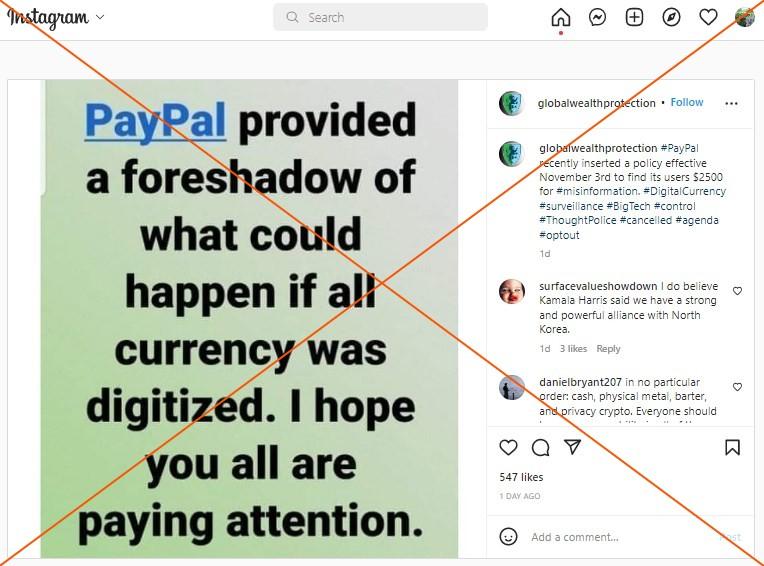
Posts mislead on PayPal misinformation policy
"#PayPal recently inserted a policy effective November 3rd to find its users $2500 for #misinformation," says an October 13, 2022 Instagram post.

The post followed October 7 reporting from The Daily Wire on an update to PayPal's acceptable use policy.
"Among the changes are prohibitions on 'the sending, posting, or publication of any messages, content, or materials' that 'promote misinformation' or 'present a risk to user safety or wellbeing,'" the conservative news site said.
The move drew fire from former PayPal president David Marcus, who tweeted October 8 that the policy "goes against everything I believe in."
Billionaire Elon Musk, a founder of PayPal, replied in a tweet: "Agreed." And US Senator Marsha Blackburn, a Republican from Tennessee, said on Twitter that PayPal was "censoring" speech.
However, a spokesperson for the company said its policy was erroneously changed and then reversed to exclude the language on misinformation.
"An Acceptable Use Policy (AUP) notice recently went out in error that included incorrect information," PayPal said in a statement released October 8 and later emailed to AFP. "PayPal is not fining people for misinformation and this language was never intended to be inserted in our policy. We're sorry for the confusion this has caused."
The Daily Wire acknowledged the reversal of policy, but social media posts continued to criticize the fintech firm.
"Paypal is COMING AFTER Your First Amendment Rights," said conservative activist Charlie Kirk in a Facebook video published October 11 and viewed more than 23,000 times.
Conservative influencer Candace Owens also reacted to the news by urging people to delete their PayPal accounts. She later acknowledged the company's policy reversal but said it was "not good enough" because PayPal had become "too lefty."
A PayPal spokesperson noted the company's terms do not call for "fines," but they do allow for "damages" to be assessed for the sale of illegal or counterfeit goods or other policy violations.
PayPal's terms, which have been in effect since September 2021, ban the sale of illegal drugs, stolen goods and items that encourage "illegal activity ... the promotion of hate, violence, racial or other forms of intolerance that is discriminatory or the financial exploitation of a crime."
Policy not 'reinstated'
In late October 2022, PayPal refuted posts claiming it had "reinstated" a policy that fines users for spreading misinformation.
The posts appeared to confuse PayPal's user agreement with its acceptable use policy. Neither has been updated this year, according to PayPal.
The user agreement says customers may not "provide false, inaccurate or misleading information." The policy, intended to prevent fraud, does not have a financial penalty, but it may result in suspension or termination.
"PayPal’s long-standing Acceptable Use Policy serves to help protect customers and our payments platform against illicit and fraudulent activity," a spokesperson said in an email on October 28, 2022.
"To be clear, PayPal does not fine customers for AUP violations. In some situations, sellers may be liable for damages associated with investigatory costs when sellers engage in activities that violate the AUP, like fraud, counterfeiting or other illegal activity. This is not a new policy, nor has the intent of this provision changed."
AFP Fact Check previously reported on misinformation about how payments via apps like PayPal are taxed.
October 31, 2022 This article was updated with a PayPal statement in response to posts claiming the payment platform had "reinstated" a policy penalizing users for spreading misinformation.
Copyright © AFP 2017-2026. Any commercial use of this content requires a subscription. Click here to find out more.
Is there content that you would like AFP to fact-check? Get in touch.
Contact us
